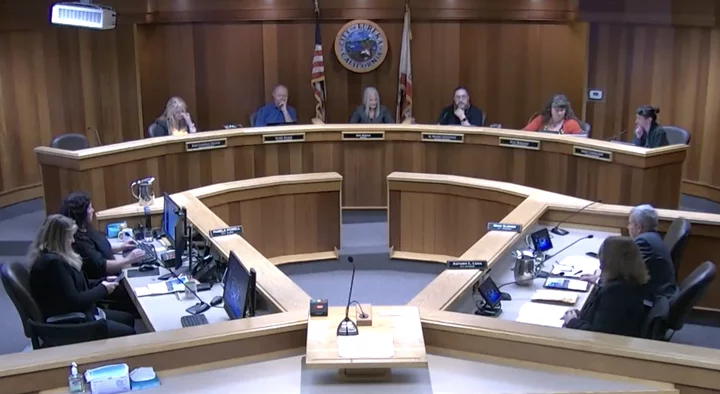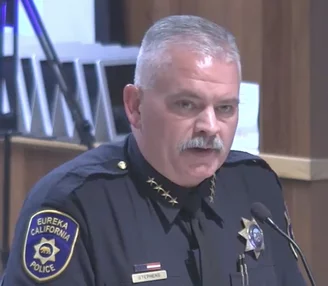Captura de pantalla de la reunión del Consejo de Eureka del martes.
###
¿Hasta dónde debería llegar la vigilancia del crimen por parte del Departamento de Policía de Eureka en la ciudad?
En la reunión del martes, el Concejo Municipal de Eureka consideró los pros y los contras de una propuesta del Departamento de Policía de Eureka para instalar 21 cámaras de lectura automática de matrículas (ALPR) a lo largo de las principales avenidas de la ciudad. Después de una extensa conversación, el consejo finalmente decidió posponer su decisión debido a preocupaciones de privacidad.
La tecnología, que sería proporcionada por Flock Safety, recopila detalles de las matrículas de cada automóvil que pasa y almacena esa información en una base de datos que permite a las agencias de aplicación de la ley comparar los números de matrícula con vehículos robados o individuos buscados por cargos criminales. ALPR no utiliza tecnología de reconocimiento facial y los datos se eliminan después de 30 días.
El Jefe de Policía de EPD, Brian Stephens, presentó el borrador de la política ALPR - vinculada aquí - al consejo el martes y explicó cómo ha cambiado la policía comunitaria desde el cambio de siglo. “Ya no es tan fácil hacer cumplir la ley como lo era”, dijo. “No podemos simplemente poner a los agentes en la calle … y esperar que obtengamos los resultados que queremos o los resultados que podríamos haber visto hace 20 años”.
Dicho esto, Stephens enfatizó que EPD “siempre necesitará oficiales en la calle”, pero dijo que la tecnología ALPR de Flock “realmente tiene la capacidad de ser un multiplicador de fuerza” para el departamento.
“Podremos localizar vehículos asociados con delitos cometidos en nuestra región más rápidamente”, continuó. “Podemos utilizar esta tecnología como una herramienta de investigación para ampliar las investigaciones después de que se haya cometido un crimen en nuestra ciudad, dar a nuestros investigadores pistas más rápidas y reducir el tiempo que un sospechoso está potencialmente suelto para victimizar a otros en nuestra comunidad.”
El borrador de la política de EPD se basó en la política ALPR del Departamento de Policía de Vallejo y las mejores prácticas emitidas por Lexipol, una compañía con sede en Texas que proporciona pautas de políticas y estándares de capacitación para agencias de aplicación de la ley en todo el país, según dijo Stephens. Los datos recopilados a través del programa ALPR se almacenarían en una “nube segura” a la que solo podrían acceder ciertos miembros del personal de EPD.
“Recuerden, todo lo que el sistema está recopilando es la descripción del vehículo y la matrícula, nada más”, dijo Stephens. “[Los datos] no son propiedad de Flock, y Flock no puede acceder a los datos para sus fines. Solo EPD puede determinar quién tiene acceso a los datos. Por lo tanto, Flock Safety no puede vender ni compartir estos datos con terceros, y esto será parte de nuestro contrato”.
Speaking via Zoom, Flock’s Community Affairs Manager Jonathan Paz said the company uses “end-to-end encryption,” a security method that prevents third parties from accessing data while it is being transferred from one system or device to another. “Let’s say the DMV is hacked – they’re not going to have access to our system,” Paz said. “We are end-to-end encrypted and manage our own system.”
Paz also shared a few success stories from the 400-plus law enforcement agencies that contract with Flock Safety. He recalled one instance in which ALPR technology helped local police officers track down three individuals who had brutally assaulted a man in the Bay Area. Investigators got hold of a possible license plate for the suspect vehicle, ran it through the Flock system and, about a month-and-a-half after the assault, were able to track down and arrest the suspects.
Paz also claimed that San Merino, a city in Los Angeles County, has seen a “70 percent decrease in residential burglaries” after increasing the number of ALPR cameras in the city.
“I can go on and on,” he said.
However, Flock’s success stories weren’t compelling enough to convince the city council, all of whom shared concerns about privacy and data sharing.
Councilmember Scott Bauer asked Paz to expand on the data protection measures Flock Safety employs and whether the company uses facial recognition technology.
“None of your personal data is actually being stored,” Paz said. “The only data that would actually be kept would be your vehicle fingerprint. … If there was a capture of a red Honda, the most data that would be shared that would be affiliated with you would be potentially your license plate, which is owned by the state, technically. So, not saying that there isn’t a concern there, but there is no personal information being stored within our systems.”
Councilmember Kati Moulton asked Paz several questions about data protection and the physical location of the company’s servers. Paz said the company’s IT department is based in Georgia but noted that they also partner with Amazon for data storage.
“So, if law enforcement in another state – or in our state or anywhere at all – got a warrant to ask Amazon for information from Eureka, circumventing the EPD… and your company itself and going directly after the storage that is now in a fourth party’s hands. … What’s to stop that from happening?” Moulton asked.
Paz seemed hesitant to speak to the hypothetical situation but said Flock Safety would honor its contract with the City of Eureka “regardless of whatever pending litigation is happening.”
“That data we consider to be yours, and we’re helping monitor and help preserve it,” he added. “But we have a contractual obligation to hard delete after 30 days.”
Councilmember Leslie Castellano asked about immigration law and whether the ALPR system would allow an out-of-state department to track an individual “for immigration reasons.”
The city’s draft policy “does not permit the sharing of ALPR data gathered by the city or its contractors/subcontractors for purpose of federal immigration enforcement,” in accordance with state law. Even if state law were to change, Stephens said the city’s policy would not be affected.
“I think the policy is clear that it won’t be used … to track anyone or to share information for immigration purposes,” he said. “If I’m the chief at that time, if something gets rolled back, it’s not going to change the reasons why we want and need the system. I still wouldn’t report that information for that purpose.”
Castellano also asked about the projected cost of the ALPR program and whether it would increase over time. Eureka City Manager Miles Slattery said the city is looking at a two-year agreement with Flock that would cost about $74,000 for installation and monitoring services in the first year and $60,000 in subsequent years.
“If it gets to the point where it can’t fit within our budget, or if it gets to the point at which it’s not within staff’s purview under the procurement policy – which is $100,000 – that purchase would have to come back to council,” Slattery added.
Castellano noted that the Humboldt County Sheriff’s Office recently implemented its own ALPR program and asked if Eureka’s cameras would be redundant. Stephens said HCSO does not currently have cameras “near the ingress and egress points of the city.”
At one point in the discussion, Moulton suggested that the city’s Community Oversight on Police Practices (COPP) board and the City Attorney’s Office review the draft policy before the council makes a final decision on the matter. Her suggestion was echoed by the rest of the council.
La abogada de la ciudad Autumn Luna dijo que sentía que sería más apropiado que su oficina abordara los problemas legales planteados durante la discusión del consejo antes de enviar la política propuesta a la junta de COPP para su revisión. Luna añadió que probablemente tomaría unos meses “realmente desarrollar” todos los problemas planteados en la reunión.
Después de un poco más de discusión, el consejo votó 5-0 para posponer la discusión hasta que la Oficina del Abogado de la Ciudad y la junta de COPP de la ciudad tuvieran la oportunidad de revisar la política de ALPR.


CLICK TO MANAGE